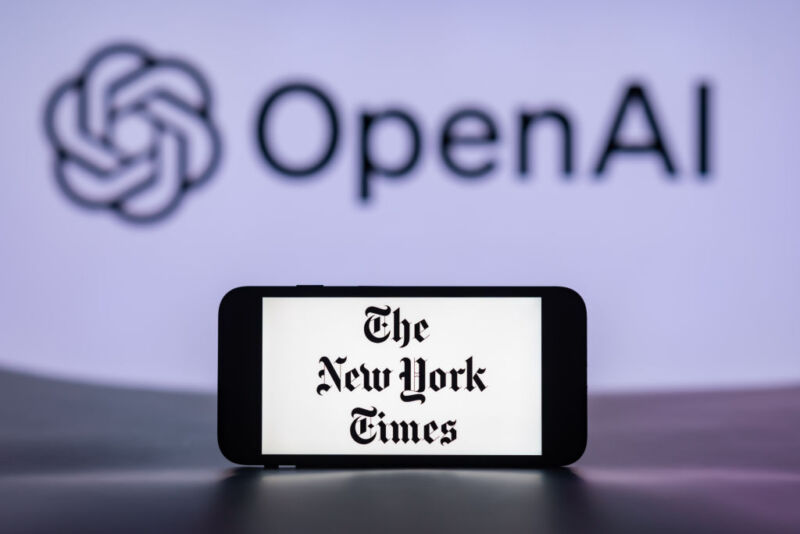Artificial intelligence (AI) has been billed as the next frontier of humanity: the newly available expanse whose exploration will drive the next era of growth, wealth, and human flourishing. It’s a scary metaphor. Throughout American history, the drive for expansion and the very concept of terrain up for grabs—land grabs, gold rushes, new frontiers—have provided a permission structure for imperialism and exploitation. This could easily hold true for AI.
This isn’t the first time the concept of a frontier has been used as a metaphor for AI, or technology in general. As early as 2018, the powerful foundation models powering cutting-edge applications like chatbots
have been called
“frontier AI.” In previous decades, the internet itself was considered an electronic frontier. Early cyberspace pioneer John Perry Barlow
wrote
“Unlike previous frontiers, this one has no end.” When he and others founded the internet’s most important civil liberties organization, they called it the
Electronic Frontier Foundation
.
America’s experience with frontiers is fraught, to say the least. Expansion into the Western frontier and beyond has been a driving force in our country’s history and identity—and has led to some of the darkest chapters of our past. The tireless drive to conquer the frontier has directly motivated some of this nation’s most extreme episodes of racism, imperialism, violence, and exploitation.
That history has something to teach us about the material consequences we can expect from the promotion of AI today. The race to build the next great AI app is not the same as the California
gold rush
. But the potential that outsize profits will warp our priorities, values, and morals is, unfortunately, analogous.
Already, AI is starting to look like a
colonialist
enterprise. AI tools are helping the world’s largest tech companies grow their power and wealth, are spurring nationalistic competition between empires racing to capture new markets, and threaten to supercharge government surveillance and systems of apartheid. It looks more than a bit like the competition among colonialist state and corporate powers in the seventeenth century, which together carved up the globe and its peoples. By considering America’s past experience with frontiers, we can understand what AI may hold for our future, and how to avoid the worst potential outcomes.
America’s “Frontier” Problem
For 130 years, historians have used frontier expansion to explain sweeping movements in American history. Yet only for the past thirty years have we generally acknowledged its disastrous consequences.
Frederick Jackson Turner famously introduced the frontier as a central concept for understanding American history in his vastly influential
1893 essay
. As he concisely wrote, “American history has been in a large degree the history of the colonization of the Great West.”
Turner used the frontier to understand all the essential facts of American life: our culture, way of government, national spirit, our position among world powers, even the “struggle” of slavery. The endless opportunity for westward expansion was a beckoning call that shaped the American way of life. Per Turner’s essay, the frontier resulted in the individualistic self-sufficiency of the settler and gave every (white) man the opportunity to attain economic and political standing through hardscrabble pioneering across dangerous terrain.The New Western History movement, gaining steam through the 1980s and led by researchers like Patricia Nelson Limerick,
laid plain
the racial, gender, and class dynamics that were always inherent to the frontier narrative. This movement’s story is one where frontier expansion was a tool used by the white settler to perpetuate a power advantage.The frontier was not a siren calling out to unwary settlers; it was a justification, used by one group to subjugate another. It was always a convenient, seemingly polite excuse for the powerful to take what they wanted. Turner grappled with some of the negative consequences and contradictions of the frontier ethic and how it shaped American democracy. But many of those whom he influenced did not do this; they celebrated it as a feature, not a bug. Theodore Roosevelt wrote
extensively
and
explicitly
about how the frontier and his conception of white supremacy justified expansion to points west and, through the prosecution of the Spanish-American War, far across the Pacific. Woodrow Wilson, too,
celebrated
the imperial loot from that conflict in 1902. Capitalist systems are “addicted to geographical expansion” and even, when they run out of geography, seek to produce new kinds of spaces to expand into. This is what the geographer
David Harvey
calls the “
spatial fix
.”Claiming that AI will be a transformative expanse on par with the Louisiana Purchase or the Pacific frontiers is a bold assertion—but increasingly plausible after a year dominated by ever more impressive demonstrations of generative AI tools. It’s a claim bolstered by billions of dollars in corporate investment, by intense interest of regulators and legislators worldwide in steering how AI is developed and used, and by the variously utopian or apocalyptic prognostications from thought leaders of all sectors trying to understand how AI will shape their sphere—and the entire world.
AI as a Permission Structure
Like the western frontier in the nineteenth century, the maniacal drive to unlock progress via advancement in AI can become a justification for political and economic expansionism and an excuse for racial oppression.
In the modern day, OpenAI
famously
paid dozens of Kenyans little more than a dollar an hour to process data used in training their models underlying products such as ChatGPT. Paying low wages to data labelers surely can’t be equated to the
chattel slavery
of nineteenth-century America. But these workers did endure brutal conditions, including being set to constantly review content with “graphic scenes of violence, self-harm, murder, rape, necrophilia, child abuse, bestiality, and incest.” There is a
global
market for this kind of work, which has been essential to the most important recent advances in AI such as
Reinforcement Learning with Human Feedback
,
heralded
as the most important breakthrough of ChatGPT.
The gold rush mentality associated with expansion is taken by the new frontiersmen as permission to break the rules, and to build wealth at the expense of everyone else. In 1840s California, gold miners
trespassed
on public lands and yet were
allowed
to stake private claims to the minerals they found, and even to exploit the water rights on those lands. Again today, the game is to push the boundaries on what rule-breaking society will accept, and hope that the legal system can’t keep up.
Many internet companies have behaved in exactly the same way since the dot-com boom. The prospectors of internet wealth lobbied for, or simply took of their own volition, numerous government benefits in their scramble to capture those frontier markets. For years, the Federal Trade Commission has looked the other way or been lackadaisical in halting antitrust abuses by
Amazon
,
Facebook
, and
Google
. Companies like Uber and Airbnb exploited loopholes in, or ignored outright, local laws on taxis and hotels. And Big Tech platforms enjoyed a
liability shield
that protected them from punishment the contents people posted to their sites.
We can already see this kind of boundary pushing happening with AI.
Modern frontier AI models are trained using data, often copyrighted materials, with
untested
legal justification.
Data is like water
for AI, and, like the fight over
water rights
in the West, we are repeating a familiar process of public acquiescence to private use of resources. While some lawsuits are
pending
, so far AI companies have faced no significant penalties for the unauthorized use of this data.
Pioneers of self-driving vehicles tried to
skip permitting
processes and used
fake demonstrations
of their capabilities to avoid government regulation and entice consumers. Meanwhile, AI companies’ hope is that they won’t be held to blame if the AI tools they produce spew out harmful content that causes damage in the real world. They are trying to use the
same
liability shield that fostered Big Tech’s exploitation of the previous electronic frontiers—the web and social media—to protect their own actions.
Even where we have concrete rules governing deleterious behavior, some hope that using AI is itself enough to skirt them. Copyright infringement is illegal if a person does it, but would that same person be punished if they train a large language model to
regurgitate
copyrighted works? In the political sphere, the Federal Election Commission has precious few powers to police political advertising; some wonder if they simply
won’t be considered relevant
if people break those rules using AI.
AI and American Exceptionalism
Like The United States’ historical frontier, AI has a feel of American exceptionalism. Historically, we believed we were different from the Old World powers of Europe because we enjoyed the manifest destiny of unrestrained expansion between the oceans. Today, we have the
most CPU power
, the
most data scientists
,
the most venture-capitalist investment
, and the
most AI companies
. This exceptionalism has historically led many Americans to believe they don’t have to play by the same rules as everyone else.
Both historically and in the modern day, this idea
has led
to deleterious consequences such as militaristic
nationalism
(leading to justifying of foreign
interventions
in Iraq and elsewhere),
masking
of severe inequity within our borders, abdication of responsibility from global treaties on
climate
and
law enforcement
, and
alienation
from the international community. American exceptionalism has also wrought havoc on our country’s engagement with the internet, including lawless spying and surveillance by forces like the National Security Agency.
The same line of thinking could have disastrous consequences if applied to AI. It could
perpetuate
a nationalistic, Cold War–style narrative about America’s inexorable struggle with China, this time predicated on an AI arms race. Moral exceptionalism justifies why we should be allowed to use tools and weapons that are dangerous in the hands of a competitor, or enemy. It could
enable
the next stage of growth of the military-industrial complex, with claims of an urgent need to modernize missile systems and drones through using AI. And it could
renew
a rationalization for violating civil liberties in the US and human rights abroad, empowered by the idea that racial profiling is more objective if enforced by computers.The inaction of Congress on AI regulation threatens to land the US in a regime of de facto American exceptionalism for AI. While the EU is about to pass its comprehensive
AI Act
,
lobbyists
in the US have muddled legislative action. While the Biden administration has used its
executive authority
and federal purchasing power to exert some limited control over AI, the gap left by lack of legislation leaves AI in the US looking like the
Wild West
—a largely unregulated frontier.The lack of restraint by the US on potentially dangerous AI technologies has a global impact. First, its tech giants let loose their products upon the global public, with the harms that this brings with it. Second, it creates a negative incentive for other jurisdictions to more forcefully regulate AI. The EU’s regulation of high-risk AI use cases begins to look like unilateral disarmament if the US does not take action itself. Why would Europe tie the hands of its tech competitors if the US refuses to do the same?
AI and Unbridled Growth
The fundamental problem with frontiers is that they seem to promise cost-free growth. There was a constant pressure for American westward expansion because a bigger, more populous country accrues more power and wealth to the elites and because, for any individual, a better life was always one more wagon ride away into “empty” terrain. AI presents the same opportunities. No matter what field you’re in or what problem you’re facing, the attractive opportunity of AI as a free labor multiplier probably seems like the solution; or, at least, makes for a good sales pitch.
That would actually be okay, except that the growth isn’t free. America’s imperial expansion displaced, harmed, and subjugated native peoples in the Americas, Africa, and the Pacific, while
enlisting
poor whites to participate in the scheme against their class interests. Capitalism makes growth look like the solution to all problems, even when it’s clearly not. The problem is that so many costs are externalized. Why pay a living wage to human supervisors training AI models when an outsourced gig worker will do it at a fraction of the cost? Why power data centers with renewable energy when it’s cheaper to surge energy production with
fossil fuels
? And why fund social protections for wage earners
displaced
by automation if you don’t have to? The potential of consumer applications of AI, from personal digital assistants to self-driving cars, is irresistible; who wouldn’t want a machine to take on the most routinized and aggravating tasks in your daily life? But the externalized cost for consumers is accepting the inevitability of domination by an elite who will extract every possible profit from AI services.
Controlling Our Frontier Impulses
None of these harms are inevitable. Although the structural incentives of capitalism and its growth remain the same, we can make different choices about how to confront them.
We can strengthen basic democratic protections and market regulations to avoid the worst impacts of AI colonialism. We can require ethical employment for the humans toiling to label data and train AI models. And we can set the bar higher for mitigating bias in training and harm from outputs of AI models.
We don’t have to cede all the power and decision making about AI to private actors. We can create an
AI public option
to provide an alternative to corporate AI. We can provide universal access to ethically built and democratically governed foundational AI models that any individual—or company—could use and build upon.
More ambitiously, we can choose not to privatize the economic gains of AI. We can cap corporate profits, raise the minimum wage, or redistribute an automation dividend as a universal basic income to let everyone share in the benefits of the AI revolution. And, if these technologies save as much labor as companies say they do, maybe we can also all have some of that time back.
And we don’t have to treat the global AI gold rush as a zero-sum game. We can emphasize international cooperation instead of competition. We can align on shared values with international partners and create a global floor for responsible regulation of AI. And we can ensure that access to AI uplifts developing economies instead of further marginalizing them.
This essay was written with Nathan Sanders, and was originally published in
Jacobin
.
 chevron_right
chevron_right






 Starting last year, various rightsholders have filed
Starting last year, various rightsholders have filed

